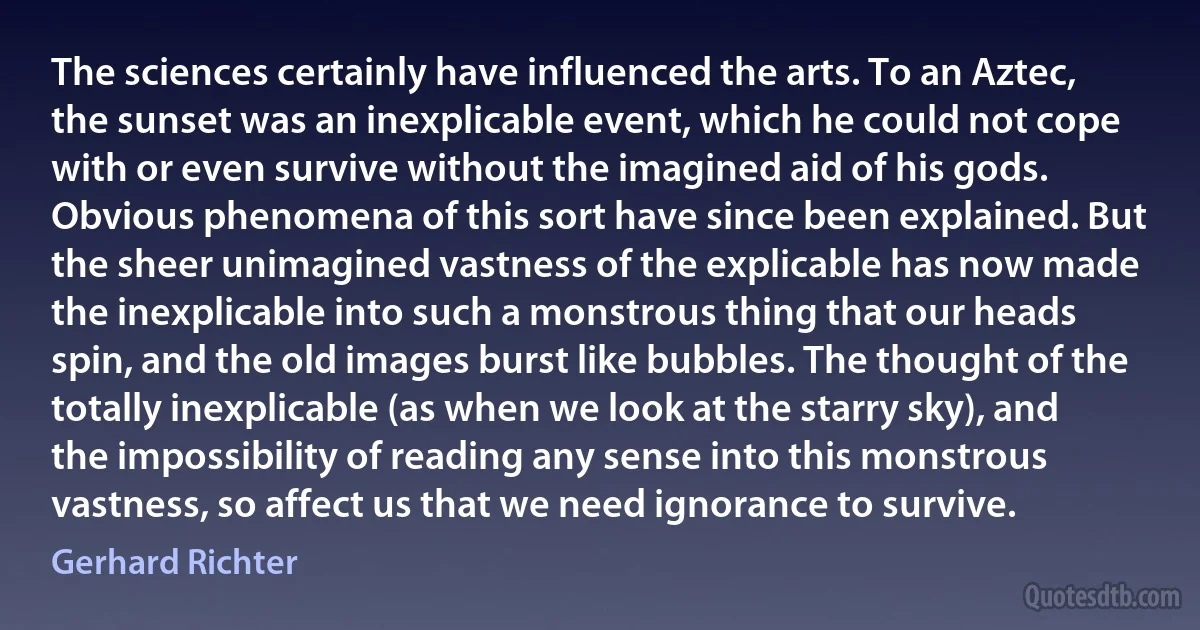
The sciences certainly have influenced the arts. To an Aztec, the sunset was an inexplicable event, which he could not cope with or even survive without the imagined aid of his gods. Obvious phenomena of this sort have since been explained. But the sheer unimagined vastness of the explicable has now made the inexplicable into such a monstrous thing that our heads spin, and the old images burst like bubbles. The thought of the totally inexplicable (as when we look at the starry sky), and the impossibility of reading any sense into this monstrous vastness, so affect us that we need ignorance to survive.
Gerhard RichterRelated topics
aztec burst ignorance need now reading sense sky sort spin thing thought vastness gods heads sciencesRelated quotes
Of course I constantly despair at my own incapacity, at the impossibility of ever accomplishing anything, of painting a valid, true picture or even knowing what such a thing ought to look like. But then I always have the hope that, if I persevere, it might one day happen. And this hope is nurtured every time something appears, a scattered, partial, initial hint of something which reminds me of what I long for, or which conveys a hint of it – although often enough I have been fooled by a momentary glimpse that then vanishes, leaving behind only the usual thing.

Gerhard Richter
The clerical work is par for the course. "Keep on file in numerical order" means throw in wastebasket. You'll soon learn the language. "Let it be a challenge to you" means you're stuck with it; "interpersonal relationships" is a fight between kids; "ancillary civic agencies for supportive discipline" means call the cops; "Language Arts Dept." is the English office; "literature based on child's reading level and experiential background" means that's all they've got in the Book Room; "non-academic-minded" is a delinquent; and "It has come to my attention" means you're in trouble.

Bel Kaufman
If you seek reality you must set yourself free of all backgrounds, of all cultures, of all patterns of thinking and feeling. Even the idea of being man or woman, or even human should be discarded. The ocean of life contains all, not only humans. So, first of all abandon all self-identification, stop thinking of yourself as such-and-such or so-and-so, this or that. Abandon all self-concern, worry not about your welfare, material or spiritual, abandon every desire, gross or subtle, stop thinking of achievement of any kind. You are complete here and now, you need absolutely nothing.

Nisargadatta Maharaj
Modern man, seeking a middle position in the evaluation of sense impression and thought, can, following Plato, interpret the process of understanding nature as a correspondence, that is, a coming into congruence of pre-existing images of the human psyche with external objects and their behaviour. Modern man, of course, unlike Plato, looks on the pre-existent original images also as not invariable, but as relative to the development of a conscious point of view, so that the word "dialectic" which Plato is fond of using may be applied to the process of development of human knowledge.

Wolfgang Pauli
Theater of Cruelty means a theater difficult and cruel for myself first of all. And, on the level of performance, it is not the cruelty we can exercise upon each other by hacking at each other's bodies, carving up our personal anatomies, or, like Assyrian emperors, sending parcels of human ears, noses, or neatly detached nostrils through the mail, but the much more terrible and necessary cruelty which things can exercise against us. We are not free. And the sky can still fall on our heads. And the theater has been created to teach us that first of all.

Antonin Artaud
